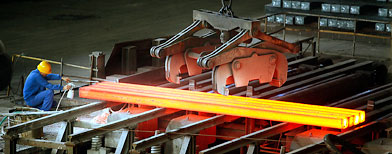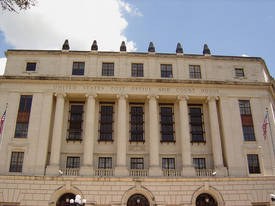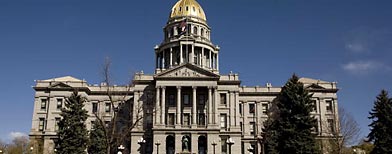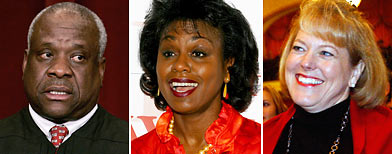Charlotte-Mecklenburg police continue to look Wednesday morning for the mother of two teens who are accused by authorities of working with the same chemical compound used by "Shoe Bomber" Richard Reid.
Meanwhile, inspectors returned shortly after daybreak Wednesday to the Mount Holly Road home where dozens of local, state and federal agents searched Monday and Tuesday for the source of an explosive thought to have been used in a pen that detonated in a student's hand at a north Charlotte school.
Three firefighters suffered minor injuries Monday while investigating materials found at the house, in northwest Charlotte.
Police are searching today for Tracy Bauguess, who faces charges of malicious injury by use of an explosive device, and possession of a weapon of mass destruction.
Her 16-year-old son, Jessie Bauguess, is jailed under $500,000 bond and faces numerous charges. Also arrested in Tracy Bauguess' 15-year-old son, whose name has not been released.
Bauguess spoke briefly with police Monday when they arrived at her home for an initial search, but she has not been seen since. Police say she is driving a purple Honda Civic, with N.C. license tags XRJ-2678. Anyone who sees Bauguess or her car is asked to call 911.
Officer Robert Fey, a spokesman for Charlotte-Mecklenburg police, said investigators found a "significant quantity" of powerful and unstable explosives in the house, along with materials that could be used to make more explosives.
Authorities detonated materials several times Tuesday at the house, shaking the neighborhood.
Residents living near the house, in the 10600 block of Mount Holly Road, were forced from their homes Monday by police, but evacuations were not ordered Tuesday.
"The quantity located was capable of extreme damage and loss of life within the community," Fey said.
That explosive compound was identified by authorities as triacetone triperoxide. It is the same compound used by Reid, who placed the explosive in his shoes before boarding an American Airlines flight in December 2001. His attempt to detonate the explosive failed, and Reid is not in prison.
He was linked by authorities to Al Qaida.
It is unclear why the Bauguess teens were using the compound, but there were several broadcast reports Wednesday morning that Jessie Bauguess had gotten into trouble at a previous school, in part because of his fascination with explosives.
With federal agents, police blocked off about a mile of Mt. Holly Road for most of Monday and Tuesday as they conducted "render safe" operations at the single-story house the Bauguess family rents.
The series of events began about 9 a.m. Monday, when a student tried to open a pen in a classroom at Turning Point Academy, a Charlotte-Mecklenburg alternative school on West Sugar Creek Road for students who have experienced discipline problems at other schools. The pen exploded.
Jessie Bauguess was arrested at the school immediately after the pen blast, which left fragments lodged in the arm and chest of the 15-year-old boy, and also burned his hand. Police said they arrested Bauguess' 15-year-old brother at the home Monday afternoon, but did not release his name because he's a juvenile.
Initially, there was speculation that the incident might have been a prank, but police said Tuesday it was a serious matter.
N.C. court records show Jessie Bauguess has no criminal history as an adult in North Carolina, and that his mother has a single charge of driving without insurance, which was dismissed in 2006.
Jessie Bauguess now faces charges of with malicious use of explosives causing damage to property and causing injury, possession of a weapon on school grounds; and three counts of arson or unlawful burning causing injury to a firefighter. He was being held Tuesday in the Mecklenburg jail under $500,000 bond.
The injured firefighters suffered bumps and bruises, fire officials said, and were treated and released from local hospitals. Police identified the explosive that injured them as triacetone triperoxide, known as TATP.
Instructions to make TATP, which is powerful and often unstable, are easily found on the internet. The explosive has been used in terrorist attacks, including the 2005 London subway bombings.
The bomb squad caused "significant structural damage" to the Bauguess house, which was declared unsafe for occupancy Tuesday. A neighbor owns the home and had been renting it to the Bauguess family. A woman who answered the phone at the owner's house declined comment.
Jacqueline Carmack, another neighbor, said police left "a big old hole" in the back wall of the Bauguess' house. She said she didn't know the Bauguess brothers who live across the street, but she often saw them hanging out in front of the house and hadn't heard they were troublemakers.
The first explosion happened about 9 a.m. Monday in a classroom at Turning Point, when a student took the top off of an ink pen. Police said the pen contained the same TATP explosive found at the teens' home.
Bomb-sniffing dogs were sent through the school at least three times Monday, without finding other explosives.
Classes resumed Tuesday morning at Turning Point, but school staff collected all writing utensils from students as they arrived. The students were given new pens and pencils instead.

More on TATP
The chemical compound that police say was being used by two teens arrested in connection with explosions that injured four people in Charlotte this week is known as the "Mother of Satan" by some terrorist groups.
Police have not suggested that the teen-age boys arrested this week in Charlotte had any significant plans for the explosives they were using, but the compound is considered by authorities to be an extremely dangerous material.
It was used by Richard Reid, the so-called "Shoe Bomber." And it is suspected of being used in subway bombings in London.
Charlotte-Mecklenburg police say they found quantities of triacetone triperoxide (TATP) inside the Mount Holly Road home where Tracy Bauguess and her two sons lived.
Three firefighters were injured Monday while searching the home. Earlier that day, a student at Turning Point Academy was hurt when a pen exploded in his hands.
Officer Robert Fey, a spokesman for CMPD, said the amount of TATP discovered in the house could have done significant damage in the community.
Over the past decade, TATP has become the weapon of choice by many terrorist groups. The chemicals needed to mix the compound are fairly easy to acquire, authorities say. The compound is very unstable, and accidental explosions have been reported.
The compound is a white powder with a strong acrid smell.
When it first started being used by terrorist groups, about a decade ago, TATP was difficult to detect by crime dogs. But scientists have developed new tools which have made it much easier to find.
Among the best-known incidents of TATP or suspected TATP use:
-- On Dec. 22, 2001, witnesses said Richard Reid, a passenger on American Airlines Flight 63, flying from Paris to Miami, tried to detonate an explosive in his shoes. The effort failed, and the flight, with 200 passengers, was diverted to Boston.
Reid was found guilty in a U.S. court and sentenced in January 2003 to life in prison. In his sentencing, Reid expressed support for Al Qaida leader Osama bin Laden.
-- On July 7, 2005, terrorists detonated several bombs on London subway trains. The attacks killed 52 civilians and four terrorists. While authorities are not certain, they suspect TATP was used in at least some of the bombs.
-- TATP also was discovered during the arrests of several other terrorist cells in recent years in Europe.



 The 'a little learning' version is widely attributed to Alexander Pope (1688 - 1744). It is found in An Essay on Criticism, 1709, and I can find no earlier example of the expression in print:
The 'a little learning' version is widely attributed to Alexander Pope (1688 - 1744). It is found in An Essay on Criticism, 1709, and I can find no earlier example of the expression in print: Again, there is a degree of misquotation here, as what 'my Lord Bacon', the English politician and philosopher Francis Bacon, Viscount St Alban, actually said, in The Essays: Of Atheism, 1601, was:
Again, there is a degree of misquotation here, as what 'my Lord Bacon', the English politician and philosopher Francis Bacon, Viscount St Alban, actually said, in The Essays: Of Atheism, 1601, was:


















 "Not only will this settlement end harassment of photographers outside federal courthouses, it will free people to photograph and film outside of all federal buildings," said NYCLU Associate Legal Director Christopher Dunn, lead counsel in the case. "The regulation at issue in this case applies to all federal buildings, not only courthouses, so this settlement should extend to photography near all federal buildings nationwide.
"Not only will this settlement end harassment of photographers outside federal courthouses, it will free people to photograph and film outside of all federal buildings," said NYCLU Associate Legal Director Christopher Dunn, lead counsel in the case. "The regulation at issue in this case applies to all federal buildings, not only courthouses, so this settlement should extend to photography near all federal buildings nationwide.  But while the banks are ultimately responsible, the root of the problem appears to lie with "foreclosure mill" law firms like Stern's. These operations process foreclosure cases on behalf of lenders, and their business model is based on moving the paperwork through as quickly as possible. That's why such firms have pioneered practices like "robo-signing" -- whereby their employees process thousands of court documents in pending foreclosures without ever actually reviewing them, as the law requires. Of course, it's in the banks' interest for their contractors to move quickly, because the faster a foreclosure moves, the less time a struggling borrower has to fight it... His $15 million, 16,000-square-foot mansion occupies a corner lot in a private island community on the Atlantic Intracoastal Waterway. It is featured on a water-taxi tour of the area's grandest estates, along with the abodes of Jay Leno and billionaire Blockbuster founder Wayne Huizenga, as well as the former residence of Desi Arnaz and Lucille Ball. (Last year, Stern snapped up his next-door neighbor's property for $8 million and tore down the house to make way for a tennis court.) Docked outside is Misunderstood, Stern's 130-foot, jet-propelled Mangusta yacht -- a $20 million-plus replacement for his previous 108-foot Mangusta. He also owns four Ferraris, four Porsches, two Mercedes-Benzes, and a Bugatti -- a high-end Italian brand with models costing north of $1 million a pop.
But while the banks are ultimately responsible, the root of the problem appears to lie with "foreclosure mill" law firms like Stern's. These operations process foreclosure cases on behalf of lenders, and their business model is based on moving the paperwork through as quickly as possible. That's why such firms have pioneered practices like "robo-signing" -- whereby their employees process thousands of court documents in pending foreclosures without ever actually reviewing them, as the law requires. Of course, it's in the banks' interest for their contractors to move quickly, because the faster a foreclosure moves, the less time a struggling borrower has to fight it... His $15 million, 16,000-square-foot mansion occupies a corner lot in a private island community on the Atlantic Intracoastal Waterway. It is featured on a water-taxi tour of the area's grandest estates, along with the abodes of Jay Leno and billionaire Blockbuster founder Wayne Huizenga, as well as the former residence of Desi Arnaz and Lucille Ball. (Last year, Stern snapped up his next-door neighbor's property for $8 million and tore down the house to make way for a tennis court.) Docked outside is Misunderstood, Stern's 130-foot, jet-propelled Mangusta yacht -- a $20 million-plus replacement for his previous 108-foot Mangusta. He also owns four Ferraris, four Porsches, two Mercedes-Benzes, and a Bugatti -- a high-end Italian brand with models costing north of $1 million a pop. 












